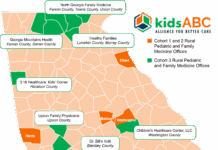
MACON – Mercer University School of Medicine’s Center for Rural Health and Health Disparities hosted a meeting of the National Advisory Committee on Rural Health and Human Services (NACRHHS) earlier this month.
NACRHHS is a federal advisory committee that advises the Secretary of Health and Human Services on healthcare challenges in rural America.
Based on their leadership in rural maternal health, Dr. Jacob Warren, Rufus C. Harris Endowed Chair and director of Center for Rural Health and Health Disparities, and Dr. Bryant Smalley, associate dean for research, were asked by the Federal Office of Rural Health Policy to convene rural Georgia experts from throughout the state to share their experiences and recommendations with the committee.

During the meeting, which focused on improving maternal health outcomes in rural areas, NACRHHS committee members met with panels of Georgia leaders in rural maternal health clinical and social services to learn about challenges and opportunities in improving maternal health.
“Georgia has the unfortunate reality of having the highest maternal mortality rate in the United States, and rural Georgians – particularly women of color – face even higher risk,” said Dr. Warren. “We were honored to be asked to convene this meeting here in Georgia where the need is so great.”
NACRHHS is a non-partisan, independent advisory group representing public-private partnership focused on the provision of health care in rural areas. Its 21 appointed members include clinicians, social service providers, academics, industry leaders and former legislators. The meeting also included federal rural health leaders from within the Health Resources and Services Administration, the Centers for Disease Control and Prevention, the Indian Health Service and the Centers for Medicare and Medicaid Services.
Based upon their discussion with the panels, NACRHHS will create a series of policy recommendations that will be taken directly to the Secretary of Health and Human Services.
“Having a role in helping NACRHHS develop its policy recommendations is humbling,” said Dr. Smalley. “There are many things that can be done to stem the maternal health crisis, and knowing that the highest levels of government are focused on this issue and truly listening to rural communities brings hope for change.”
About the Center for Rural Health and Health Disparities
The Center for Rural Health and Health Disparities, an NIH Center of Excellence, is housed within the School of Medicine and is dedicated to implementing community-driven solutions to health disparity issues in rural areas of Georgia. Its mission is 1) to partner with rural communities to engage in interdisciplinary research, training, and community outreach designed to generate novel, community-driven methods for eliminating health disparities; and 2) to provide data-driven policy recommendations to improve rural health issues. The Center operates a $6 million federal portfolio focused on maternal and infant mortality reduction, opioid overdose prevention and chronic disease self-management.










